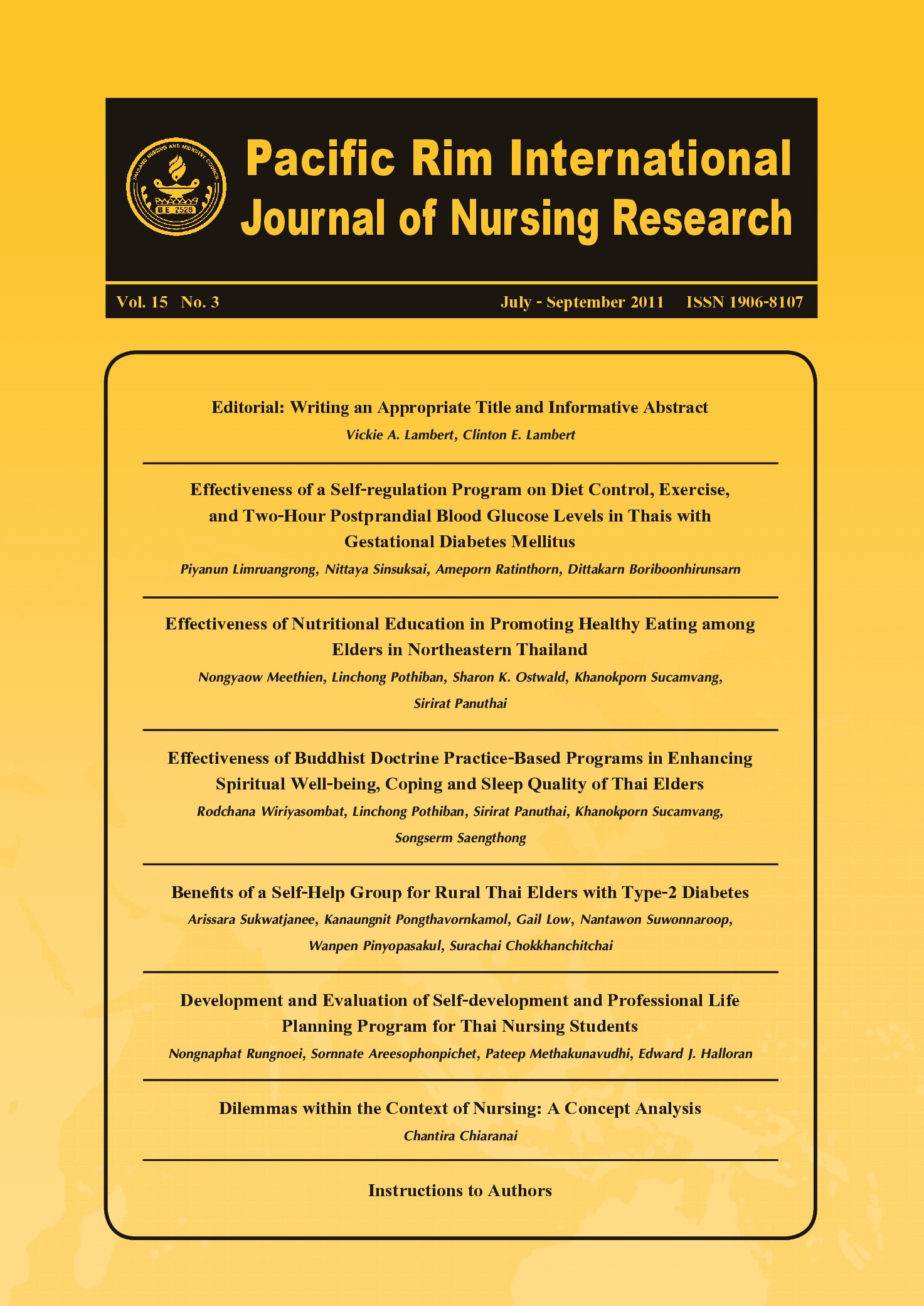Benefits of a Self-Help Group for Rural Thai Elders with Type-2 Diabetes
Keywords:
โรคเบาหวานชนิดที่ 2, คุณภาพชีวิต, ความสามารถดูแลตนเอง, กลุ่มช่วยเหลือตนเอง, ระดับน้ำตาลในเลือด, Type-2 Diabetes, Quality of life, Self-efficacy, Self-help group, Blood glucose levelsAbstract
บทคัดย่อ
วัตถุประสงค์ของการวิจัยเชิงปฏิบัติการแบบมีส่วนร่วมในผู้สูงอายุไทยในชนบทที่เป็นโรค เบาหวานชนิดที่ 2 นี้เพื่อ: (1) ศึกษาการรับรู้เกี่ยวกับประสบการณ์การมีส่วนร่วมในกลุ่มช่วยเหลือ ตนเองว่าส่งผลต่อความสามารถดูแลตนเองและคุณภาพชีวิตอย่างไรและ (2) เปรียบเทียบคะแนนความ สามารถดูแลตนเอง คุณภาพชีวิตและระดับนำตาลในเลือดก่อนและหลังการมีส่วนร่วมในกลุ่มช่วยเหลือ ตนเอง การวิจัยนี้ได้แนวคิดจากแผนพัฒนาระบบสุขภาพแห่งชาติ พ.ศ. 2550-2554 ที่ส่งเสริมให้มี การสำรวจความต้องการและพัฒนากลุ่มช่วยเหลือตนเองสำหรับผู้สูงอายุในชนบท ประกอบกับการที่ ผู้สูงอายุไทยในชนบทที่เป็นโรคเบาหวานชนิดที่ 2 ได้ประสบกับภาวะแทรกซ้อนของโรคและอุปสรรค หลายประการในการดูแลตนเองอันก่อให้เกิดผลเสียต่อสุขภาพและคุณภาพชีวิต ได้มีการนำทฤษฎี วิพากษ์สังคม (Critical Social Theory) มาเป็นกรอบแนวคิดสำหรับการทำวิจัย เก็บข้อมูลจากการมี ส่วนร่วมในกลุ่มช่วยเหลือตนเองและแบบสอบถาม ผู้ร่วมวิจัย 20 คนถูกคัดเลือกจากรายชื่อผู้ป่วยที่ เป็นโรคเบาหวานชนิดที่ 2 ที่ขึ้นทะเบียนผู้ป่วยไว้ที่สถานีอนามัยของหมู่บ้านหนึ่งในจังหวัดหนึ่งของภาคกลาง ผู้ร่วมวิจัยได้เข้าร่วมกลุ่มช่วยเหลือตนเองทุกสองสัปดาห์เป็นเวลา 6 เดือน ข้อมูลเชิงคุณภาพจาก การประชุมกลุ่มและการสังเกตถูกนำมาวิเคราะห์เชิงเนื้อหา ข้อมูลเชิงปริมาณอันประกอบด้วยระดับ น้ำตาลในเลือด แบบสอบถามเกี่ยวกับความสามารถดูแลตนเองและคุณภาพชีวิตทั้งก่อนและหลังเข้า ร่วมกลุ่มช่วยเหลือตนเองได้นำมาวิเคราะห์หาค่าความแตกต่างด้วยสถิติ paired-samples t test
จากการเข้ากลุ่มช่วยเหลือตนเองพบประโยชน์ที่ผู้ร่วมวิจัยได้รับ 4 ด้านคือ ความรู้ที่สอดคล้อง กับวัฒนธรรมท้องถิ่น (culturally-sensitive knowledge) การช่วยเหลือทางสังคม ความมีพลังอำนาจ และการรับรู้ความสามารถตนเอง (self-efficacy) ผลการวิจัยแสดงให้เห็นว่าการรับรู้ความสามารถตนเอง ได้ส่งเสริมให้ผู้ร่วมวิจัยมีกิจกรรมการดูแลตนเองเมื่อเป็นโรคเบาหวานชนิดที่ 2 มากขึ้น นอกจากนี้พบ ว่าการเข้ากลุ่มช่วยเหลือตนเองทำให้ผู้ร่วมวิจัยมีคะแนนความสามารถดูแลตนเองและคุณภาพชีวิตเพิ่ม ขึ้นและมีระดับน้ำตาลในเลือดก่อนรับประทานอาหารเช้าลดลง กลุ่มช่วยเหลือตนเองนับว่าเป็นประโยชน์ อย่างยิ่งสำหรับการส่งเสริมสุขภาพผู้สูงอายุไทยในชนบทที่เป็นโรคเบาหวานชนิดที่สอง
คำสำคัญ : โรคเบาหวานชนิดที่ 2, คุณภาพชีวิต, ความสามารถดูแลตนเอง, กลุ่มช่วยเหลือตนเอง, ระดับน้ำตาลในเลือด
Abstract
The objectives of this participatory action research, with rural Thai elders with type-2 diabetes, were to: (a) explore perspectives of the elders with respect to how taking part in a self-help group on diabetes affected their self-care ability and quality of life; and, (b) compare self-efficacy and quality of life scores, and blood glucose levels, of the elders, before and after participation in a self-help group on diabetes. The research was undertaken in light of the fact that: Thailand’s 2007-2011 national health plan promotes identification of needs for, and development of, community self-help groups for rural elders; and, rural Thai elders, with type-2 diabetes, face multiple self-care barriers and complications, which put them at risk for poor health and decreased quality of life.
Critical Social Theory was used as the guiding framework for the study. Data were gathered through use of a self-help group and questionnaires. Twenty participants were selected, from a database of elders with type-2 diabetes, who were registered at the community health care center of a rural village, in central Thailand. Participants took part in the self-help group, every other week, for 6 months. Qualitative data, from the self-help group meetings and observations, were analyzed via content analysis. Quantitative data, including fasting blood sugar levels and data from questionnaires assessing the elders’ self-efficacy and quality of life, obtained prior to and after completion of the self-help group, were analyzed through use of paired-samples t-test.
Upon completion of the self-help group, four themes emerged from the qualitative data. The themes included: obtained culturally-sensitive knowledge; perceived social support; perceived sense of empowerment; and, perceived self-efficacy. The results revealed positive self-efficacy enabled participants to improve their self-care activities. In addition, the quantitative data suggested participants, after completion of the self-help group, had higher self-efficacy and quality of life scores, as well as lower fasting blood sugar levels. Thus, the use of a community-based self-help group appeared to be an effective health promotion strategy for rural Thai elders with type-2 diabetes.
Keywords : Type-2 Diabetes, Quality of life, Self-efficacy, Self-help group, Blood glucose levels
Downloads
How to Cite
Issue
Section
License
Copyright: The Pacific Rim International Journal of Nursing Research, Thailand Nursing & Midwifery Council has exclusive rights to publish, reproduce and distribute the manuscript and all contents therein.








.png)



